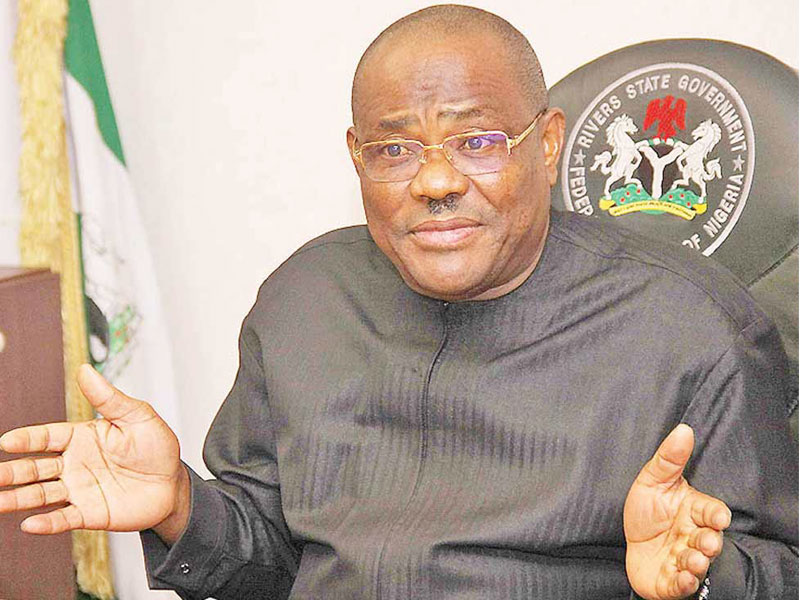Business
MPC Nominees Promise To End Forex, Food Crises
Published
1 year agoon
By
Editor
The Senate on Wednesday grilled nominees for membership of the Central Bank of Nigeria’s Monetary Policy Committee over the forex crisis and unending food crisis.
President Bola Tinubu had, last week, forwarded to the Senate for confirmation, the names of nominees for the committee of the CBN.
In giving the request expeditious consideration ahead of the MPC meeting slated for next Monday, February 26, the Senate, through its Committee on Banking, Insurance, and Other Financial Institutions, grilled six out of the nominees with questions on required urgent solutions to forex volatility and food crisis.
READ ALSO: EFCC Grills Former Kwara Gov AbdulFatah Ahmed For Second Day Over ₦10bn
The first to be grilled was the Director-General of the Securities and Exchange Commission, Lamido Yuguda, who informed the committee that his nomination into MPC would give the SEC the needed voice in monetary policy.
Yuguda lamented that the value of the Naira as it is today, is not real, having lost its intrinsic value but that the MPC, when inaugurated on Monday, would join other stakeholders to stabilise the national currency.
He said, “The value of any currency is measured by the goods and services that it can buy. The Naira, as it is today, does not possess that value sufficiently which is being critically looked into.”
READ ALSO: Nigerians Knock Seyi Tinubu For Preaching Endurance Over Economic Hardship
In his submission, the nominee from Lagos State, Dr. Mustapha Akinkunmi, said the way out now is to target the exchange rate and not inflation as currently being tackled which hasn’t yielded so much result.
He saod, “A more proactive way of addressing the Naira volatility problem at hand is for the CBN to target the exchange rate itself and not inflation.
“The inflation the country is facing now is largely that of food inflation, which is beyond CBN but for the entire country.
“Production and distribution of food commodities across the country would help to reduce the food inflation, while the aggressive target of the exchange rate, would help to stabilise the Naira with the required increase in productivity.”
READ ALSO: VIDEO: Reject IMF, World Bank Offers – Falana Cautions FG
In a similar submission, the nominee from Imo State, Mrs Aku Odinkemelu, said productivity is the key to arresting the volatility of the Naira and food inflation.
Other nominees grilled at the session by the committee were Prof. Murtala Sagagi, Kano State; Bamidele Amoo, Kwara State; and Aloysius Ordu, who worked with the World Bank and the African Development Bank for 30 years at different times.
In his closing remarks, the committee’s chairman, Senator Tokunbo Abiru (APC, Lagos East), told the nominees that their screening was done ahead of the MPC meeting slated for next Monday by the CBN.
Abiru said what Nigerians expect to come after the meeting are solutions to the rising inflation rate, worsening Naira volatility in the forex market and the general rejuvenation of the economy.
You may like


753 Duplexes: Abuja Court Admits Emefiele To N2bn Bail


Reps To Quiz Edun, Cardoso Over Non-compliance With Fiscal Responsibility Act


JUST IN: CBN Retains 27.50% Interest Rate Again


Nigeria’s External Reserves Increase As CBN Releases 2024 Financial Results


CBN Opens Up On Introducing New ₦5,000, ₦10,000 Notes


Alleged $6.3m Fraud: Court Defers Trial Of 3 CBN Officials

The Naira experienced a slight depreciation on Friday at the official market, trading at N1,528.56 to the dollar.
Data obtained from the website of the Central Bank of Nigeria (CBN) showed that the Naira lost N2.73.
This represents a 0.17 percent loss compared to the N1,525.82 recorded on Thursday.
READ ALSO:Naira Appreciates At Official Market
The Naira, which opened the week on Monday with a gain of N9.52 against the dollar, held steady gains until Thursday.
On Wednesday, the local currency gained N3.42 against the dollar and received commendation from the International Monetary Fund (IMF).
The IMF, in its 2025 Article IV Consultation report on Nigeria, commended the CBN for its reforms to the foreign exchange market, which supported price discovery and liquidity.
Business
JUST IN: Dangote Refinery Hikes Petrol Ex-depot Price
Published
2 weeks agoon
June 20, 2025By
Editor
Nigerians may soon pay more for petrol as the Dangote Petroleum Refinery on Friday increased its ex-depot price for Premium Motor Spirit to N880 per litre, raising fresh concerns over fuel affordability and price volatility in the downstream sector.
Checks on petroleumprice.ng, a platform tracking daily product prices, and a Pro Forma Invoice seen by The PUNCH confirmed the hike, representing a N55 increase from the previous rate of N825 per litre.
The increment would ripple across the entire fuel distribution chain, likely pushing pump prices above N900/litre in some parts of the country, especially in areas far from the distribution hubs.
The hike comes despite global crude prices falling. Brent crude dipped by 3.02% to $76.47, WTI fell to $74.93, and Murban dropped to $76.97 on Friday. The decline in benchmarks offers little relief due to persistent fears of sudden supply disruptions.
READ ALSO: JUST IN: Dangote Refinery Sashes Petrol Gantry Price
The refinery has increased its reliance on imported U.S. crude and operational costs amid exchange rate instability, which adds to its pricing pressure.
On Thursday, the President of the Dangote Group, Aliko Dangote, said his 650,000-barrel capacity refinery is “increasingly” relying on the United States for crude oil.
This came as findings showed that the Dangote Petroleum Refinery is projected to import a total of 17.65 million barrels of crude oil between April and July 2025, beginning with about 3.65 million barrels already delivered in the past two months, amid ongoing allocations under the Federal Government’s naira-for-crude policy.
Dangote informed the Technical Committee of the One-Stop Shop for the sale of crude and refined products in naira initiative that the refinery was still battling crude shortages, which had led it to resort to imports from the United States.
READ ALSO:Dangote Stops Petrol Sale In Naira, Gives Condition For Resumption
On Monday, the president of the Petroleum and Natural Gas Senior Staff Association of Nigeria, Festus Osifo, accused oil marketers of exploiting Nigerians through inflated petrol prices, insisting that the current pump price of PMS should range between N700 and N750 per litre.
He criticised the disparity between falling global crude oil prices and the stagnant retail price of petrol in Nigeria.
“If you go online and check the PLAT cost per cubic metre of PMS, convert that to litres and then to our Naira, you will see that with crude at around $60 per barrel, petrol should be retailing between N700 and N750 per litre.”
He asserted that if Nigerians bear the brunt of higher fuel costs, they should be allowed to enjoy the benefit of low pricing.
His forecast of increased costs now appears spot on, considering the latest developments.
Marketers are already adjusting. Depot owners and fuel distributors in Lagos and other cities anticipate a domino effect, with new price bands expected to follow Dangote’s lead.
Many had held back pricing decisions since Tuesday, when the refinery halted sales and withheld fresh PFIs. The delay fueled speculation, allowing opportunistic price hikes across various depots.

The Naira, which has seen steady appreciation against the Dollar all week, closed stronger on Friday, trading at ₦1,580.44 in the official forex market.
Data from the Central Bank of Nigeria’s website show the Naira gained ₦4.51k against the Dollar on Friday alone.
This marks a 0.28 per cent appreciation from Thursday’s closing rate of ₦1,584.95 in the official foreign exchange window.
The local currency maintained consistent strength throughout the week, recording gains daily.
READ ALSO: Naira Appreciates Against Dollar At Foreign Exchange Market
On Monday, May 19, it traded at ₦1,598.68; on Tuesday, at ₦1,590.45; and on Wednesday, at ₦1,584.49.
These gains suggest increased investor confidence and improved forex supply, contributing to the naira’s performance.
Meanwhile, the CBN, at its 300th Monetary Policy Committee meeting held Monday and Tuesday, retained the Monetary Policy Rate at 27.5 per cent.
- Online Reports On Protest False, Intent To Tarnish Our Image – AAU Ekpoma
- Obi In Benin, Donates N15m To St Philomena School of Nursing Sciences
- What To Know About Rashidi Ladoja, The Next In To Become Olubadan
- Tension In Kano As Sanusi, Bayero Loyalists Clash Near Emir’s Palace
- Tension As FG Strips FAAN, NCAA, NAMA Of Revenue Collection Powers
- Flash Flood Warning: Sokoto, Edo, Akwa Ibom, 17 Other States At Risk In July — NiMet
- Trump Threatens Extra 10% Tariff On BRICS Nations
- Tiwa Savage Shares Emotional Moment With Son
- JUST IN: Gunmen Kill Policeman, Abduct Other In Imo
- INEC Announces Dates For Commencement Of Continuous Voter Registration In Osun
About Us
Trending

 Sports5 days ago
Sports5 days agoBREAKING: Liverpool Star Diogo Jota Is Dead

 Politics2 days ago
Politics2 days agoCoalition: Why Tinubu Must Not Sleep —Primate Ayodele

 Entertainment1 day ago
Entertainment1 day ago2Baba’s New Romance In Trouble As Natasha Fumes Over Loyalty Remark

 Sports4 days ago
Sports4 days ago5 ‘Big’ Recent Events Diogo Jota Had Before His Death

 Metro5 days ago
Metro5 days agoThree-storey Building Collapses On Lagos Island, Many Injured

 Metro1 day ago
Metro1 day agoTragedy As Navy Boat Capsizes After Free Medical Outreach In Delta

 Politics3 days ago
Politics3 days agoAmaechi: I Will Resign As FCT Minister If… Wike

 Politics4 days ago
Politics4 days agoCoalition: Abure-led LP Gives Obi 48 Hours To Leave Party

 Metro3 days ago
Metro3 days agoVIDEO: Police Arrest Varsity Student For Stabbing Colleague, Demanding Ransom In Delta

 Politics4 days ago
Politics4 days agoADC, A Coalition Of Failed Politicians – Wike

























